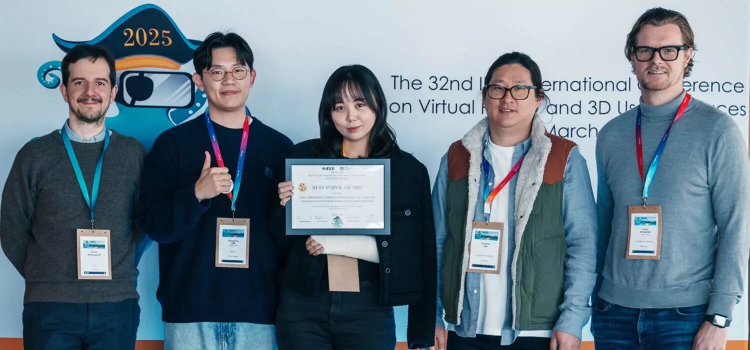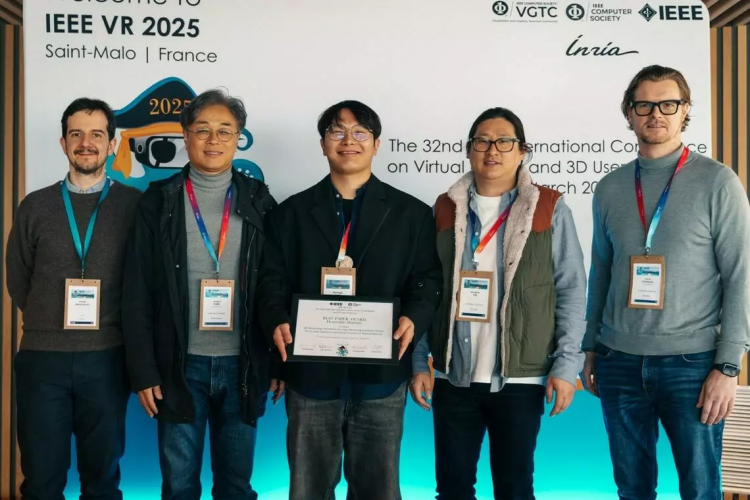What does your online persona say about you? And could a virtual dog help inspire you during your workouts?
Those are just two of the many questions a Schulich School of Engineering researcher is trying to answer as he looks into the ever-evolving world of immersive technologies, such as virtual and augmented reality (VR and AR).

From left: Ferran Argelaguet, Dooyoung Kim, Seoyoung Kang, Kangsoo Kim, Frank Steinicke
Dr. Kangsoo Kim, PhD, leads the Human-X Interaction Lab, which is dedicated to understanding how the online world influences human behaviour, identity and social connection.
His work earned him recognition at the Institute of Electrical and Electronics Engineers Virtual Reality (IEEE VR) 2025 conference, where he was part of a team that earned awards for Best Paper and an Honourable Mention.
"Receiving both of these honours was incredibly meaningful, not just as recognition, but as a celebration of our lab's ethos: combining technical rigour with human sensitivity," Kim says.
"These papers span a wide spectrum yet share a common vision of immersive technologies that serve, reflect and enhance the human experience."
The team's papers dealt with two growing areas of interest in the online world: your virtual identity and emotional connections.
Creating your online character
Avatars have become more prevalent as pieces of our professional and social lives.
The character used to represent a user has grown from a pixelated cartoon in the early days of the internet and forums to what can be an almost identical-to-real-life persona; if users want it to be.
Kim's team at IEEE VR based its winning Best Paper on the social norms that have governed what types of avatar modifications feel acceptable, especially around attributes like race, gender and facial identity.
He says their study which was led by Seoyoung Kang, a visiting PhD student from KAIST (Korea Advanced Institute of Science & Technology) offers valuable insights into how shifting social norms should help users be more thoughtful, respectful and strategic in their virtual self-representation.
"Just because digital platforms allow boundless customization doesn't mean all modifications are perceived equally," Kim says. "Your avatar is a social artifact, and how others interpret it may depend on the situation, whether it's in a work meeting, gaming with strangers, or interacting socially."
A virtual running buddy
The team's Honourable Mention was for a paper that focused on how a virtual pet could help support AR users while they're working out.
Kim says they were inspired by how real pets offer a playful, emotionally resonant experience, so they wanted to see how it would impact those in an online world.
This work was led by Dr. Hyeongil Nam, PhD, a postdoctoral researcher in the lab, and explored the potential of developing an interactive virtual dog as a social workout companion.
"Small touches like a virtual pet mimicking your movements can create a surprising sense of companionship and motivation," Kim says.
"Especially in solo workouts, the virtual dog didn't just mirror the user physically, it connected with them socially."

From left: Dr. Ferran Argelaguet, Dr. Jong-Il Park, Dr. Hyeongil Nam, Dr. Kangsoo Kim, and Dr. Frank Steinicke. Photo Submitted
Adding user-responsive companies and not just passive visuals, Kim says, can create richer, more immersive experiences.
"Users described the mimicking dog as supportive, playful and even emotionally uplifting," he says. "What stood out was how subtle, embodied behaviours just following your squats or stretches were enough to trigger feelings of companionship and presence."
An extension of reality
Kim says the IEEE VR honours recognize his lab's ongoing mission to design systems for AR, VR and mixed reality that are innovative, socially intelligent and emotionally meaningful.
"Digital agents and avatars don't just reflect users, they shape user experience, identity and motivation," he says. "Technology becomes more meaningful when it respects the social and emotional nuances of human life."
Kim says the two studies reminded the team that, even in digital environments, rich and complex human social psychology remains.








